-
What We Do
- WHERE WE WORK
-
About Us
 Welcome Message from Carol Jenkins
Welcome Message from Carol JenkinsFor more than 90 years, World Learning has equipped individuals and institutions to address the world’s most pressing problems. We believe that, working together with our partners, we can change this world for the better.
On my travels, I’ve had the opportunity to meet with many of those who have joined us in this mission. In Baghdad, we’ve trained more than 2,300 Iraqi youth who are already giving back at home. In London, our partners in the TAAP Initiative strongly believe that we are all responsible to practice inclusion. And in Vermont, our Experiment in International Living and School for International Training participants prove every day that they have the tools and the determination to change the world.
Please join us in our pursuit of a more peaceful and just world.
- Get Involved
Media Center > Story
How a Partnership is Paving the Way to STEM Education in Kurdistan
September 6, 2019
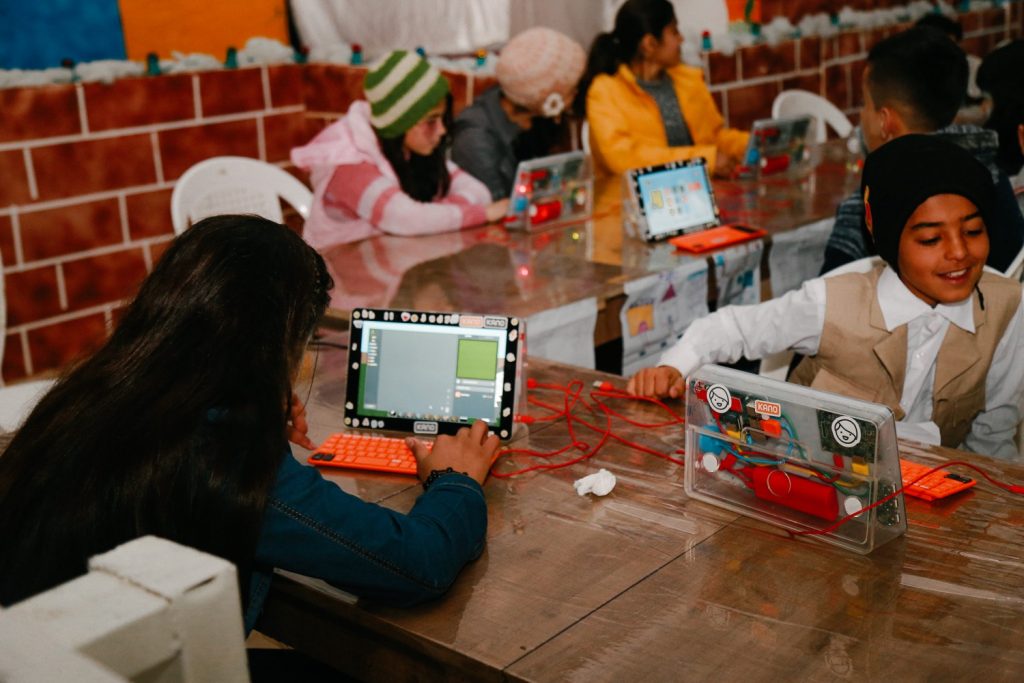
Some partnerships were meant to be.
For years, kids all over the world have been learning how to program computers and build robots as part of the global movement toward STEM education. But it took a bit longer for STEM to take root in Kurdistan, the autonomous northern region of Iraq.
Kurdistan Save the Children was eager to change that. Founded in 1991, the Iraqi nonprofit organization works to ensure protection, health, and education for all children. Over the years, it has developed a wide network and an excellent track record for educational youth programming.
Still, the idea of launching its own STEM initiative was daunting.
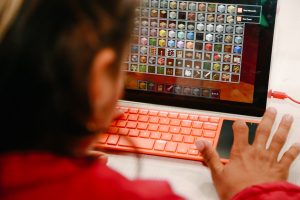
“When something is untouched like this in your region, you are kind of hesitant,” says Sara Rashid, a senior officer at Kurdistan Save the Children. “Do we have the capacity? Do we have the skills? Do we have the knowledge?”
Partnering with an organization with experience in STEM education seemed like the best solution — and, two years ago, they decided World Learning was the ideal partner.
Several staff members at Kurdistan Save the Children are alumni of the Iraqi Young Leaders Exchange Program(IYLEP), a U.S. Department of State-funded international exchange program that World Learning has facilitated for more than 10 years. They informed the organization’s leaders that World Learning was seeking a partner, too, for a new program called Kids Can Code.
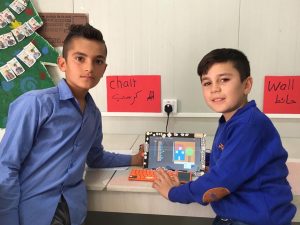
Funded by the Catalyst Foundation for Universal Education — and using computer kits and a STEM curriculum provided by the technology company Kano — Kids Can Code was designed to teach basic coding and English language skills to Syrian children living in refugee camps in Iraq. Based in Washington, DC, World Learning needed a partner on the ground that could train teachers and deal with issues as they arise.
Kurdistan Save the Children was a perfect candidate for that job. Not only did it have a depth of experience in educational programs for children, but the nonprofit also operates a youth activity center in the Arbat refugee camp in Sulaymaniyah province.
“They’re an organization that has deep roots in the community,” says Dr. Kara McBride, senior education and research specialist at World Learning. “Kurdistan Save the Children has been there ever since the first families in Arbat arrived. They have the community’s trust, and they understand their needs.”
For Kurdistan Save the Children, the partnership also held possibilities beyond developing their capacity in STEM. Rashid says World Learning’s commitment to experiential learning set it apart from other NGOs. “With World Learning, we knew it would be a different experience because they are very much education-oriented,” she says. “We were hoping to have that door open to a different approach to education.”
Training the Trainers
That door opened with the training of trainers in September 2018.
As Kurdistan Save the Children would be responsible for hiring and training the Kids Can Code teachers, it was important for key staff members to gain a deep understanding of the STEM and English curriculum first. And so, that fall, McBride traveled to Kurdistan to offer training alongside Kano’s education community manager, Taylor Chustz.
“What we learned from World Learning in a month takes three years to learn independently.”
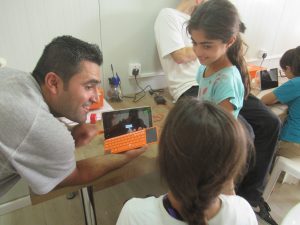
Over the course of a couple weeks, McBride and Chustz worked with the four Kurdistan Save the Children staff members — all long-serving employees — who had been designated as the program trainers to ensure its sustainability. Using Kano’s innovative kits, they learned how to teach children to build a computer and then program it to make art, games, and music. McBride also demonstrated how to incorporate experiential learning — which engages children in hands-on activities and encourages them to reflect on and learn from those experiences — into a classroom. Rashid says this flexible, child-friendly style of teaching is new to Iraq, which traditionally takes a more rigid approach to education. “It really hit home,” Rashid says.
It was clear to Rashid that her colleagues had absorbed what they’d learned when they hosted a five-day training for the new Kids Can Code teachers. That training went like clockwork: all the materials were ready and organized without any need for further adaptation.
“What we learned from World Learning in a month takes three years to learn independently,” Rashid says. “The benefits are endless.”
Flexibility and Feedback
No matter how thorough the training, though, challenges are sure to arise in a classroom. During the first cohort of Kids Can Code, World Learning remained in close touch with Kurdistan Save the Children in order to help them navigate those obstacles.
“World Learning is very flexible in giving you a lot of feedback with every report you send. Your partner is committed from beginning to end.”
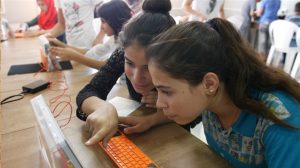
Each week, Kurdistan Save the Children submitted monitoring reports that noted issues the teachers were facing such as a lack of self-confidence among the children or divisions between the boys and the girls in the class. McBride responded to each report, offering suggestions on how to adapt the curriculum to meet those challenges.
“The difference in working with World Learning is that there isn’t a rigid format that you stick to from the beginning of a project until the end of a project,” Rashid says. “World Learning is very flexible in giving you a lot of feedback with every report you send. Your partner is committed from beginning to end.”
That made a difference when it came time to train a new set of teachers for this year’s Kids can Code cohort. Kurdistan Save the Children incorporated the lessons learned from the previous cohort directly into the teacher training. Not only did it ensure that teachers had the tools to deal with problems as they arose, but it also has helped prevent some problems from occurring. It’s an encouraging sign that Kurdistan Save the Children is now ready to step up its education programming.
Building a More Sustainable Future
In fact, Kurdistan Save the Children is already transforming its approach to education using the knowledge gained from the Kids Can Code partnership.
Having witnessed the value of experiential learning, many of the teachers hired for Kids Can Code have already been able to use the new techniques and activities they learned from McBride in the other courses they teach at Arbat.
“For World Learning to come in and train Kurdistan Save the Children in such a sustainable way, that will resonate for a long, long time.”
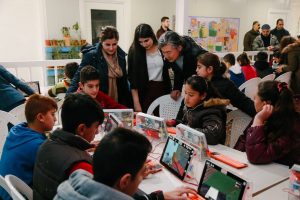
Meanwhile, the nonprofit has also built experiential learning into all its teacher trainings. Rashid says the impact of that decision cannot be underestimated given the organization’s broad reach in the region, including its role training public school teachers.
“For World Learning to come in and train Kurdistan Save the Children in such a sustainable way, that will resonate for a long, long time,” Rashid says.
Collaborating with World Learning has also given Kurdistan Save the Children the confidence it needed to venture further into the STEM education field.
Later this year, the organization plans to roll out a STEM curriculum adapted from Kids Can Code at its six other cultural activity centers — meaning that, soon, even more kids across Kurdistan will be part of the global movement toward STEM education.
That’s truly the power of partnership.





